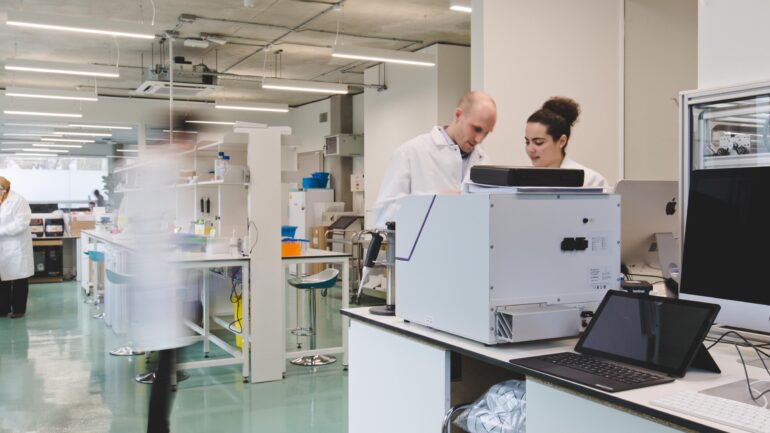TL;DR:
- LabGenius, led by James Field, redefines antibody engineering with AI.
- Antibodies are proteins that combat diseases by attaching to foreign invaders.
- Traditional antibody design is slow and labor-intensive for humans.
- LabGenius employs AI, automation, and machine learning to accelerate antibody discovery.
- Machine learning models design, build, and test antibodies with minimal human intervention.
- LabGenius’ approach yields unexpected solutions in just six weeks, compared to traditional methods.
- $28 million funding secured from investors like Atomico and Kindred.
- Potential partnerships with pharmaceutical companies to revolutionize drug discovery.
- LabGenius’ automated process promises more effective and safer antibody treatments.
Main AI News:
In the heart of South London, where once the aroma of freshly baked biscuits filled the air, now stands a hub of cutting-edge technology. The clattering of industrial ovens has given way to the precise movements of robotic arms, and the fragrance of innovation permeates the air. James Field, the visionary mind behind LabGenius, has transformed this former biscuit factory into a realm of scientific marvels, dedicated to forging a groundbreaking path in medical antibody engineering.
The human body’s immune response is safeguarded by antibodies—sentinels that shield against diseases. These protein structures are meticulously crafted to attach to foreign invaders, facilitating their elimination from the system. For decades, pharmaceutical giants have harnessed synthetic antibodies in the fight against diseases like cancer, while also curbing organ rejection in transplants.
However, the traditional process of designing these therapeutic antibodies is both arduous and time-consuming. Human protein designers wade through a sea of potential amino acid combinations, seeking the delicate balance that ensures optimal functionality. This pursuit involves extensive experimental testing, a labyrinthine task of tweaking variables to enhance certain attributes while guarding against adverse effects. James Field, the trailblazing founder and CEO of LabGenius, reflects, “Somewhere in this vast expanse of potential molecules lies the elusive structure of the antibody we seek.”
In 2012, Field established LabGenius, driven by the convergence of plummeting costs in DNA sequencing, computation, and robotics. The laboratory seamlessly integrates these advancements to automate antibody discovery. Within its Bermondsey facility, an ingenious machine learning algorithm takes center stage. It choreographs the design of antibodies, tailored to combat specific diseases. Robotic systems orchestrate their growth, meticulously conduct tests, and channel data back to the algorithm, all while human intervention remains judiciously confined. Amidst rooms bustling with cultured cells and automated DNA sequencing, technicians in lab coats tend to samples while machines hum rhythmically in the background.
The initiation point for human scientists is defining a scope of potential antibodies, each tasked with combating a unique disease. These proteins must differentiate between healthy and diseased cells, lock onto the latter, and enlist immune cells to finalize the mission. Yet, in the vast landscape of conceivable options, pinpointing the ideal candidates proves challenging. LabGenius devised a machine learning model to navigate this realm with unparalleled efficiency. “The human touch,” Field elucidates, “is to furnish the system with examples of both healthy and diseased cells. Subsequently, the system delves into myriad antibody designs that can effectively differentiate between them.”
Over 700 preliminary contenders emerge from a matrix of 100,000 potential antibodies, each meticulously curated by the algorithm. The process emulates selecting the perfect car from a vast array, commencing with broad criteria and gradually refining preferences.
A symphony of state-of-the-art equipment orchestrates the tests, from sample preparation to the various testing stages. Antibodies, born from their genetic sequences, undergo rigorous trials on biological assays—mimicking the tissues they were formulated to combat. While humans oversee these stages, their primary role entails transitioning samples between machines.
“Upon collating data from the initial set of 700 molecules, the algorithm assimilates insights to fine-tune its comprehension of the landscape,” Field elaborates. In essence, the algorithm paints an evolving picture of how diverse antibody designs impact treatment effectiveness. With each iteration, the algorithm’s proficiency advances, impeccably balancing the exploration of uncharted territories with the exploitation of promising designs.
Conventional protein engineering often succumbs to incremental tweaks, Field notes. A slight improvement in one facet might inadvertently compromise other vital attributes. This limitation confines exploration to a fixed number of tests or “shots on goal.” As a result, human engineers gravitate towards familiar territories, unconsciously entangling themselves in heuristic webs that hinder true innovation.
LabGenius breaks these barriers, yielding unforeseen solutions that transcend human imagination. Remarkably, the process—orchestrated by machine learning models—culminates in a mere six weeks, from problem inception to initial batch completion. Backed by $28 million from notable investors like Atomico and Kindred, LabGenius is poised to revolutionize antibody development and collaborate with pharmaceutical giants as a strategic partner. Field envisions applying this automated paradigm to diverse drug discovery domains, effectively streamlining a historically artisanal process.
Ultimately, Field underscores that this approach is a recipe for enhanced care: superior antibody treatments with heightened efficacy and diminished side effects. The novel molecules discovered defy conventional paradigms, often defying human intuition. As Field envisions, this innovation promises a brighter horizon for patients—a future defined by extraordinary molecules and superior therapeutic outcomes.
Conclusion:
The fusion of AI, automation, and machine learning in antibody engineering, as exemplified by LabGenius, heralds a transformative era in medical innovation. This breakthrough expedites the discovery of novel antibodies, promising quicker and safer treatments for a range of diseases. As this technology matures, it has the potential to reshape the pharmaceutical landscape, revolutionizing drug discovery processes and driving toward more effective patient outcomes.

